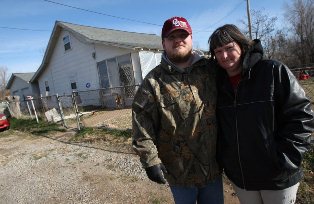News
Legal Aid offers help to those who can't afford an attorney
- 1/7/2013
- Tulsa World
Bills came in the mail every once in a while, asking Eric Widger to pay for work that a roofing company had never finished.
 Insurance was paying for damage from the 2007 ice storm, but the roofers wanted more money. And when he wouldn't - or couldn't - pay, they walked off the job. "I had already paid half up front," Widger said. "They weren't getting any more."
Insurance was paying for damage from the 2007 ice storm, but the roofers wanted more money. And when he wouldn't - or couldn't - pay, they walked off the job. "I had already paid half up front," Widger said. "They weren't getting any more."
But eventually, instead of another bill, he got a court summons. The roofing company was suing him and his wife for $20,000.
"They knew I was on disability," said Widger, who suffers from epilepsy while raising two teenage children with autism. "They knew I wouldn't be able to afford an attorney."
To defend themselves, Widger and his wife spent several hours in a library, searching through law books and trying to understand the relevant precedents.
"But we were going to lose no matter what," he said. "When you don't have a lawyer, the system is stacked against you."
The Widgers wound up with their bank account frozen. And they expected to spend the rest of their lives hopelessly in debt, until a relative told them to call Legal Aid.
"I had never heard of it," Widger said. "I had no idea there was anything like it out there."
Funded by a hodgepodge of grants, donations and taxpayer money, Legal Aid maintains 21 offices across the state with 65 attorneys on staff.
But that's not nearly enough to keep up with demand, so some cases get farmed out to Cesar Tavares and other private lawyers, who waive their usual fees.
All the work is done pro bono, or free of charge, for low-income families and senior citizens.
"In a criminal case, you have the right to an attorney," Tavares explained. "And if you can't afford one, the court appoints one for you."
In civil cases, however, defendants have no such right.
"If you can't afford an attorney," he said, "you're on your own."
Unless Legal Aid steps in.
On staff with GableGotwals, a corporate law firm with sweeping views of Tulsa from its high-rise office suite, Tavares didn't charge a dime to take the Widgers as clients.
"They were very stressed out," he said. "You could just look at them and see the burden and how it was weighing them down."
Within a few days, Tavares had the bank account unfrozen.
A few weeks later, the court reversed its ruling.
And within a year, the whole case was settled, with the Widgers' roof fixed and their good credit restored.
"The reason I became a lawyer was to help people," Tavares said. "Obviously, that's why I went to law school. And here was a chance to really do it, to really help somebody."
GableGotwals lets Tavares and his colleagues spend 10 percent to 15 percent of their time on pro bono work, which can add up to hundreds of unbilled hours.
That's extraordinarily generous, said Michael Figgins, executive director of Legal Aid Services of Oklahoma.
But it's only a fraction of what's needed.
"The first thing to know about Legal Aid," he said, "is that Legal Aid is not big enough."
More than 40,000 people a year ask for help, but Legal Aid can accommodate only one out of five of them as clients.
The other 80 percent have to settle for some free legal advice.
And that's not even counting middle-class families, who don't qualify for the free help but can't necessarily afford an attorney either.
For them, Legal Aid offers "community education" to help people better represent themselves - or better yet, avoid a legal pitfall in the first place, Figgins said.
"We're just scratching the surface," he said. "We're doing all that we can, but it's not even close to what's needed."
- Pro Bono/Legal Services